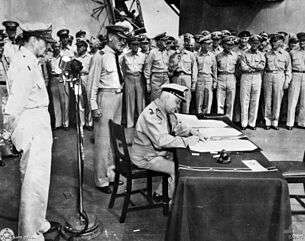Conrad Helfrich
| Conrad Helfrich | |
|---|---|
|
Conrad Emil Lambert Helfrich in 1946 | |
| Birth name | Conrad Emil Lambert Helfrich |
| Born |
11 October 1886 Semarang, Dutch East Indies |
| Died |
20 September 1962 (aged 75) The Hague, Netherlands |
| Allegiance |
|
| Service/branch |
|
| Years of service | 1907–1948 |
| Rank | Lieutenant Admiral |
| Commands held | ABDAFLOAT |
| Battles/wars | |
Luitenant-Admiraal Conrad Emil Lambert Helfrich, GNL, KCB (11 October 1886 – 20 September 1962) of the Royal Netherlands Navy was a leading Dutch naval figure of World War II. He was born in Semarang.
"In the early 1920s, when he was teaching other young sprouts at Den Helder, his favorite lecture was on the coming war between the U.S. and Japan. "When?" his students would ask him, and he would boom: "In this generation." Then he would stride to a blackboard map and chalk three Xs— on Pearl Harbor, the Panama Canal, San Francisco. 'There,' he would say, 'the attacks will fall.' "[1]
Helfrich was appointed overall commander of all forces in the Netherlands East Indies in October 1939.[2] At the outbreak of the war in the Pacific he gave instructions to wage war aggressively. His small force of submarines sank more Japanese ships in the first weeks of the war than the entire British and US navies together, an exploit which earned him the nickname "Ship-a-day Helfrich".[3] Admiral Helfrich worked tirelessly to establish co-operation with the Allied navies in the area since he knew that the Dutch could not hope to protect the Dutch East Indies by themselves.
When a combined command (ABDA) was finally created in January 1942, he was bypassed for the post of commander of the navy, in favour of Admiral Thomas C. Hart of the United States Navy. Helfrich's mission to defend Java at all costs clashed with Hart's desire to conserve as many naval units as possible. On 12 February 1942, Helfrich succeeded Hart as commander of the American-British-Dutch-Australian naval forces in the Pacific and immediately went on the offensive.[3] Unfortunately, the courage of the 'Striking Force' was to no avail in the face of the overwhelming superiority of the Japanese navy and after the disastrous Battle of the Java Sea most of the ABDA ships under his command had been put out of action and ABDA itself was dismantled. Helfrich spent the remainder of the war in Ceylon preparing the return of Dutch administration to the Dutch East Indies.

In 1945, he was given command of all Dutch naval forces and promoted to Luitenant-Admiraal. On 2 September 1945, he signed the Japanese Instrument of Surrender aboard the battleship USS Missouri on behalf of the Kingdom of the Netherlands.[2]
Helfrich returned to the Dutch East Indies on 1 October 1945, where he commanded the Dutch forces in the Dutch East Indies until 24 January 1946 when the post of Commander of the Armed Forces in the East was abolished. While Commander Helfrich was involved with military opposition to the Indonesian National Revolution. He was a fierce opponent of reaching a compromise with Sukarno and he, supported by Chief of the General Staff Hendrik Johan Kruls, objected to the Linggarjati Agreement of 15 December 1946, without effect.
He remained in command until his retirement from the navy on 1 January 1949.[2]
He wrote his memoirs which were published in 1950 and he died in the Hague, on 20 September 1962.[2]
Honours and awards
For his services during the World War, Helfrich received several awards. He was Commander of the Order of Orange-Nassau with Swords, Knight Grand Cross of the Order of the Netherlands Lion, Honorary Knight Commander of the Military Division of the Most Honourable Order of the Bath (UK) and awarded the Silver Cross (5th grade) of the Virtuti Militari (Poland). He had also received the Expedition Cross.
Notes
- ↑ TIME, Monday, 9 March 1942. "World Battlefronts: Home Is The Sailor". Cover Story.
- 1 2 3 4 Klemen, L (1999–2000). "Vice-Admiral Conrad Emil Lambert Helfrich". Forgotten Campaign: The Dutch East Indies Campaign 1941–1942.
- 1 2 TIME, Monday, 23 February 1942 (23 February 1942). "World Battlefronts: Dutchman's Chance". Time.
External links
| Wikimedia Commons has media related to Conrad Emil Lambert Helfrich. |
- Klemen, L. "Vice-Admiral Conrad Emil Lambert Helfrich". The Netherlands East Indies 1941–1942.
- http://www.absofacts.com/biografie/data/helfrichconradel.htm
- http://www.time.com/time/magazine/article/0,9171,885896-1,00.html
.jpg)